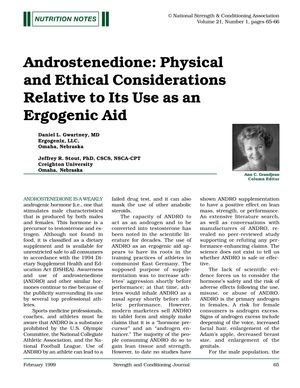Androstenedione: Risks and Lack of Efficacy in Athletes
February 1999
in “
Strength and Conditioning Journal
”

TLDR Androstenedione, a hormone supplement, doesn't improve muscle or performance and can cause harmful side effects.
In 1999, androstenedione (ANDRO) was recognized as a weakly androgenic hormone and a precursor to testosterone and estrogen, not found in food but available as a dietary supplement due to the 1994 Dietary Supplement Health and Education Act (DSHEA). Despite its popularity, especially among professional athletes, ANDRO was prohibited by several sports organizations, and there was no scientific evidence supporting its effectiveness in enhancing lean mass, strength, or performance. Risks of using ANDRO included androgen excess, which could lead to various side effects such as emotional outbursts, acne, early puberty, growth stunting, hair loss, and feminizing traits in males, and increased risks of male pattern balding, prostate issues, liver disease, and changes in blood lipids in older adults. The paper concluded that due to the lack of valid research and potential adverse effects, it was unwise to recommend or allow the use of ANDRO by athletes.





